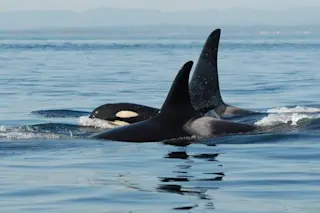Female killer whales can live up to 90 years in the wild, including 22 years after they go through menopause. That’s almost as many years as human hunter-gatherers, who lived for an average of 26 years post-menopause.
Aging female orcas remain an important part of their pods, but why not make them more important? Why would evolution select for such a long period in which the animals cannot pass on their genetic material? That’s the question a new study some 50 years in the making attempts to answer. The study's conclusions paint a picture of aging female orcas as both warmly generous and coldly calculating.
In orca pods, offspring stay close to their mothers for their entire lives, even after the mother has passed child-bearing age. While not birthing new calves, she contributes by guiding the group to good fish-catching spots and shares 57 percent of what she catches. But ...














